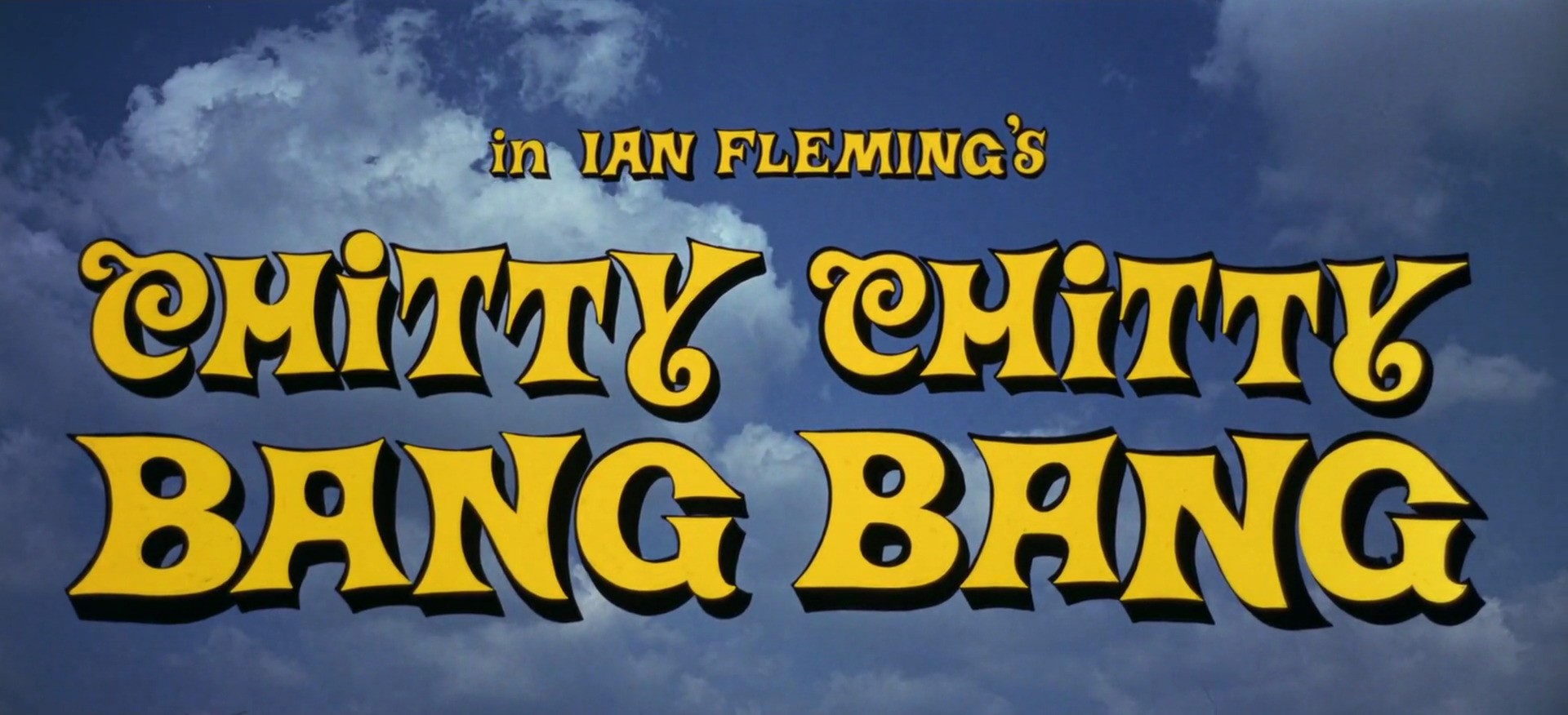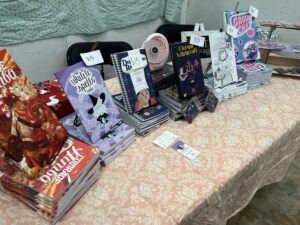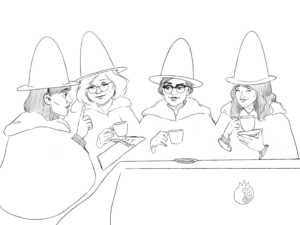Ah, Chitty Chitty Bang Bang, our fine four-fendered friend. (Chitty is a car, FYI.)
There’s really no reason for me to have seen 1968’s Chitty Chitty Bang Bang as a nineties kid, but I did and it definitely made an impression. Not quite as scarring as Balloon Land, but I’ve also never forgotten the cry of the Child Catcher. Rewatching this, though, made me very aware of a subplot that really should have been reworked.
Some basics: This movie is loosely based–with practically no plot points overlapping–on an Ian Fleming novel. That’s right, the author who wrote James Bond spy novels also penned a bizarre children’s book. Roald Dahl co-wrote the script, which is actually pretty fitting since Chitty covers some of Dahl’s major themes. Are there kids in weird circumstances? Check. Are most of the adults really terrible people? Check. Do the kids win in the end? Sort of, in that the adults do most of the planning, but still: Check. Is there something vaguely anti-Semitic? (sigh) Check.
(Dahl told The New Statesman, “There is a trait in the Jewish character that does provoke animosity, maybe it’s a kind of lack of generosity towards non-Jews. I mean, there’s always a reason why anti-anything crops up anywhere; even a stinker like Hitler didn’t just pick on them for no reason.” (double sigh))
Chitty Chitty Bang Bang (from here on abbreviated as CCBB for the title and CCBB for the car) is, for the most part, remarkably tame. There isn’t a tragic death of a parent (looking at you Lion King and Bambi) and there are no wicked stepmothers (I see you, Cinderella and Snow White), but there’s still plenty to raise an eyebrow at.
This story is pretty straightforward–at its bones: poor man meets rich woman; they fall in love–until the fictional country of Vulgaria comes on the scene.
To bring you up to speed so we can get to the awful stuff: It’s the early 1900s and CCBB opens with a poor but oh-so-happy family, the Potts. Caractacus (really), a failed inventor with an American accent, is played by Dick Van Dyke. (This was after Mary Poppins, in which his English accent was not so great and he said, Never again.) His two (British-accented) children, Jeremy and Jemima, simply adore him and don’t mention that he sounds nothing like them. The children are also really invested in the wreck of an old racecar (the eventual CCBB) and not at all invested in going to school. Poor old Grandpa hangs out in the background playing with tin soldiers.
Truly Scrumptious (yes, really) is young, beautiful, and wealthy and almost runs over Jeremy and Jemima because they don’t believe in looking both ways before running across the street. Truly almost wrecks her car, but is more concerned with the children’s truancy. Thus, a meet-nasty with Caractacus when she brings his kids home and insults his parenting skills.
Some dull plot happens and Caractacus eventually gets the money to buy the junk heap of a racecar for his kids, fixes it up, and names it Chitty Chitty Bang Bang. There’s a picnic with his kids and Truly, and then things get weird.
Oh, and did I mention that throughout all this there’s some singing?
While the Potts family and Truly are on their picnic, after some seriously concerning singing about just how scrumptious Truly is and then how truly scrumptious the kids are, Caractacus begins a story about Baron Bomburst, who rules fictional Vulgaria, and wants CCBB for himself. As Caractacus starts the story, there’s a fade out on the scene and we enter the world of his story.
They are threatened by pirates and high tide, but CCBB has the power to float away. Grandpa is kidnapped by Baron Bomburst’s spies–it’s great, they haul away the whole outhouse while Grandpa’s in it. CCBB & co. fly after him, because yes, CCBB can also fly.
And then we arrive in Vulgaria and things get exciting while also taking a turn for the worse (which is shame, because honestly up until here the movie is pretty dull). “Vulgaria” could be a parody of Bulgaria, but it has a decidedly German presence on screen. Caricature German accents, lederhosen, and references to sauerkraut. Not particularly subtle, and it gets worse.
But first, we see Baron Bomburst in his castle and holy crap are things weird. The first clue that everything is not normal in Vulgaria is that Bomburst’s preferred mode of transportation around his castle is by rocking horse. In fact, none of the adults in the castle are really exhibiting adult behavior. But this is acceptably bizarre–an agreeable amount of absurdity.
That is a badass horse, but come on.
Then, when Caractacus, Truly, and the children enter the village, they’re the center of attention because, as Truly realizes, there are no children around. Soldiers come looking for them and the kind Toymaker who hides them tells them that it’s illegal to have children in Vulgaria and they need to hide.
And here’s where things really turn. The Child Catcher arrives on the scene and an ugly picture starts to come into focus. (Say hello to Dahl’s anti-Semitic feels. Vulgaria and all its occupants were his creation.)
Rewatching this scene is uncomfortable and undeniably echoes the Holocaust. Dahl sets children up as the undesirable race and then cobbles together Jewish stereotypes to hunt them out. Really? To what end?
Endless sighing.
It’s difficult to imagine that the director and producer were unaware of the Holocaust implications of the Child Catcher and his scenes, which makes me wonder what they hoped to convey with these choices. Was their argument that a Jewish figure with power over arguably German subjects could provide catharsis? A blood-letting, of sorts? Or, suspending my disbelief, could it be commentary on how a strictly policed society (taken to the absurd in this instance) is a society doomed to fail, and using German and Jewish caricatures was sure to resonate with audiences?
If they had good intentions–which again, I seriously doubt–perpetuating negative stereotypes in service of a villainous role pretty much overshadowed them. It’s hard to interpret this as anything but a Holocaust metaphor, as the Child Catcher stomps down into the cellar and cries, “You have to know where to look. Like cockroaches, they get under the floors, in the cracks in the walls, in the woodwork.” It’s terrible rhetoric and it is such a needless side plot.
Meanwhile, Caractacus and the Toymaker go to scope out the castle to try and rescue Grandpa and Truly goes to look for food, leaving the children alone. So, naturally, when the Child Catcher comes back and promises tasty treats for free, the children are unable to resist. They’re lured into a cage and presented to the Baron and Baroness as “unique specimens,” a phrase that gives me some serious Josef Mengele vibes.
We find out that the Toymaker and other sympathetic people have hidden the village’s children away to protect them from the Bombursts. And so, as all leading men must, Caractacus comes up with a plan to save the day and free the children by taking down Baron and Baroness Bomburst. I suppose this rousing scene, this call to action, could serve as a sort of balm to weird vibes, but by this point I was just incredibly disappointed.
Yeah, Baron, I feel ya.
The rest of the movie carries on, treading lightly and wrapping up loose ends, but it all feels rather tarnished now. The Baron has his birthday party, which the children ruin. The Child Catcher makes another appearance, before being surrounded and subdued by said children. The Potts and Truly escape back to reality, where Jeremy and Jemima ask if Caractacus and Truly will be getting married. Caractacus hedges because he’s broke as a joke and Truly calls him a snob (possibly my favorite moment). It’s short-lived animosity, though, because Truly’s father is buying one of Caractacus’s inventions and now he feels rich enough to be truly worthy of Truly. Gag me with a spoon.
I remember loving this movie. The whimsy, the music, the derring-do of Caractacus to save his family. But now I’m left with “Chitty Chitty Bang Bang” stuck in my head, and I’m thinking about how much better this movie would have been if they’d taken the better path and cut the German accents altogether and let the Child Catcher be some creepy Englishman. (For a modern remake, I vote Tom Hiddleston, or, if Americans are in the running, Doug Jones.)
With Balloon Land, I knew what to expect: something bizarre, absurd, and ever so faintly horrifying. Chitty Chitty Bang Bang was all that and more, when I had expected just some light-hearted fun. 0/10, would not rewatch.











